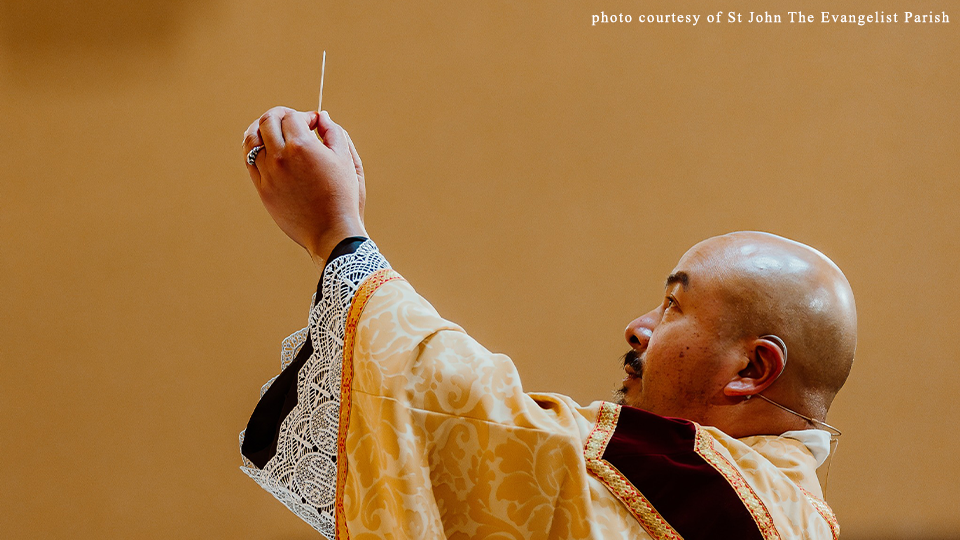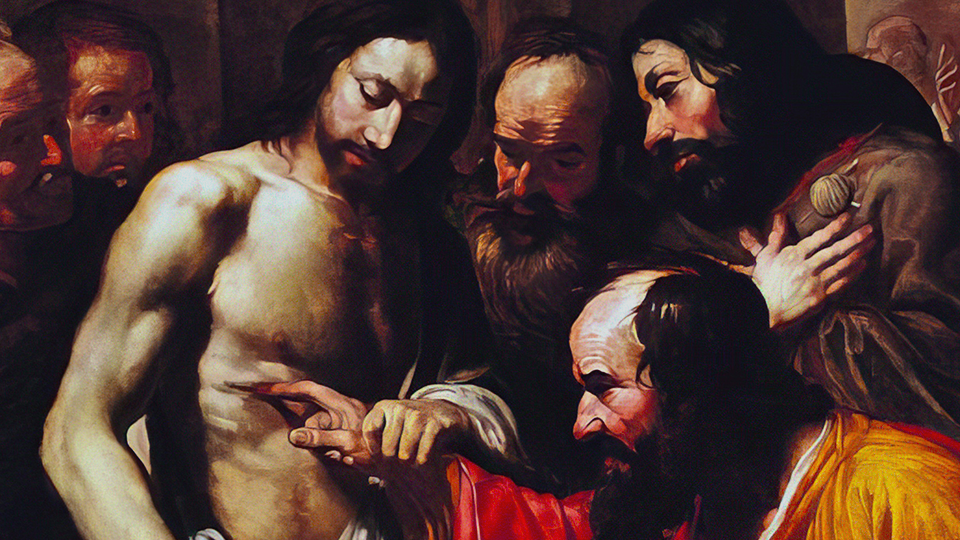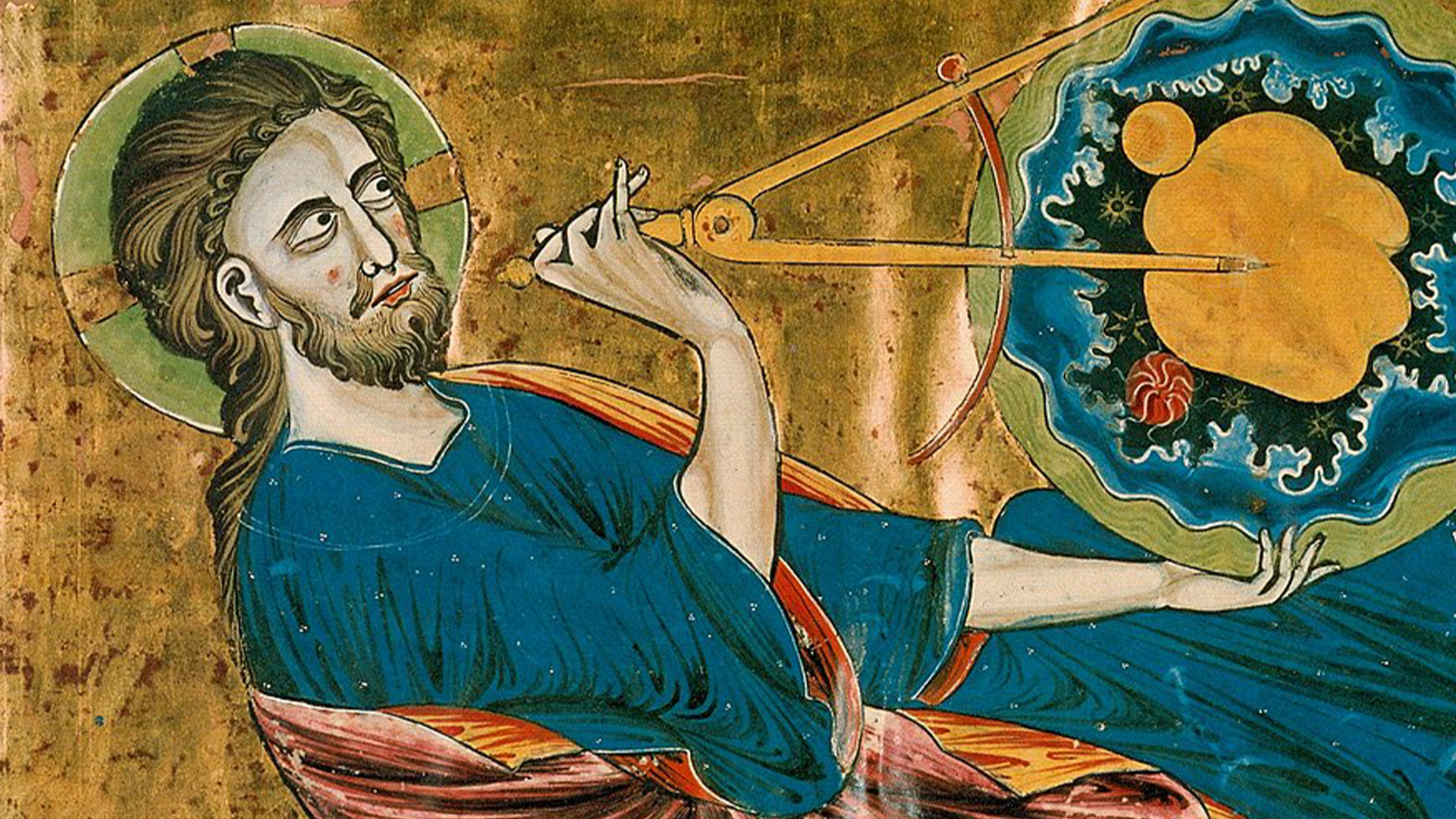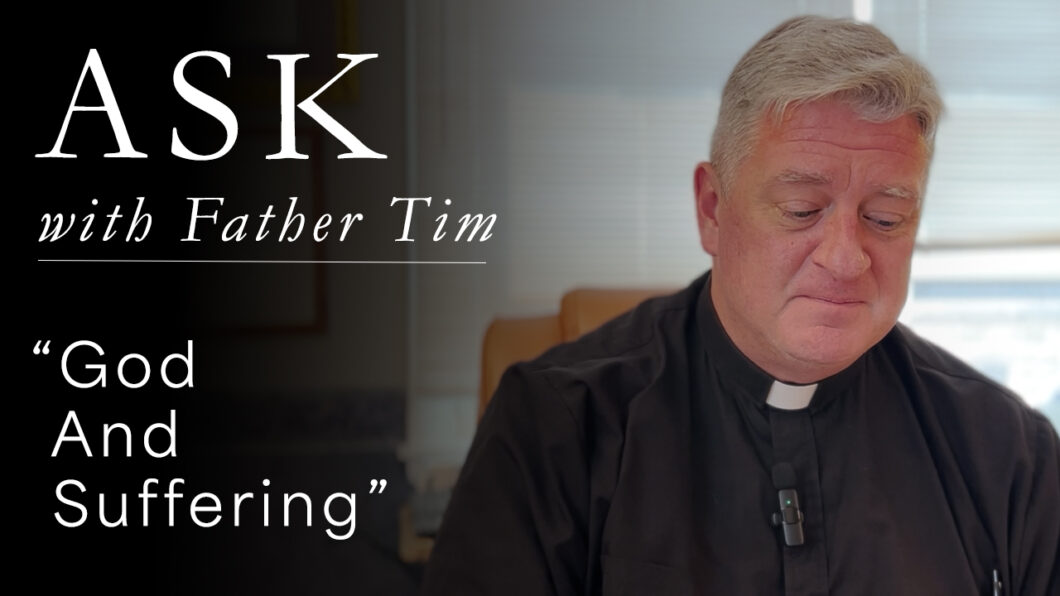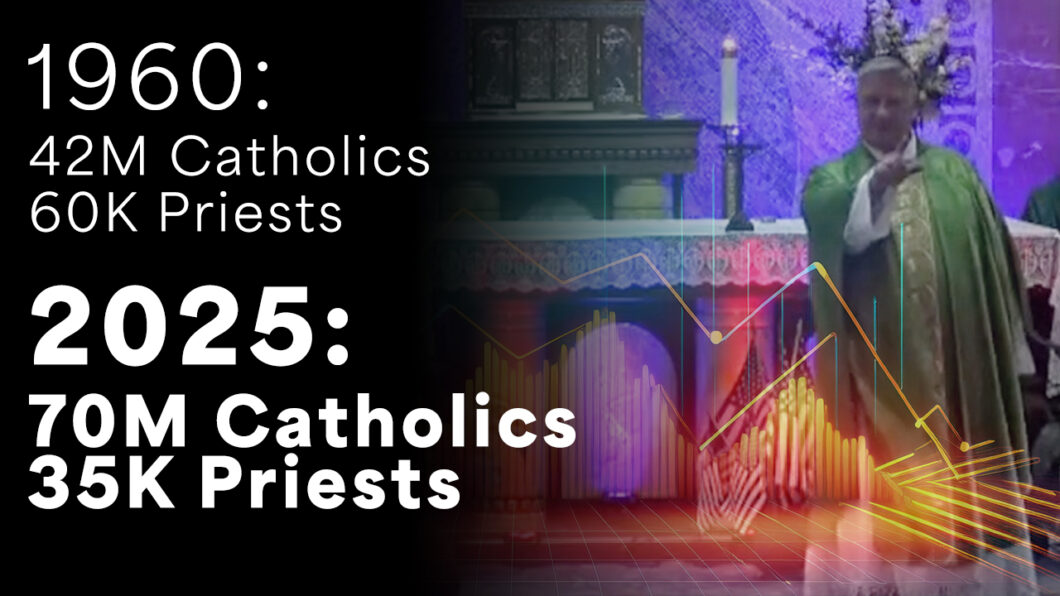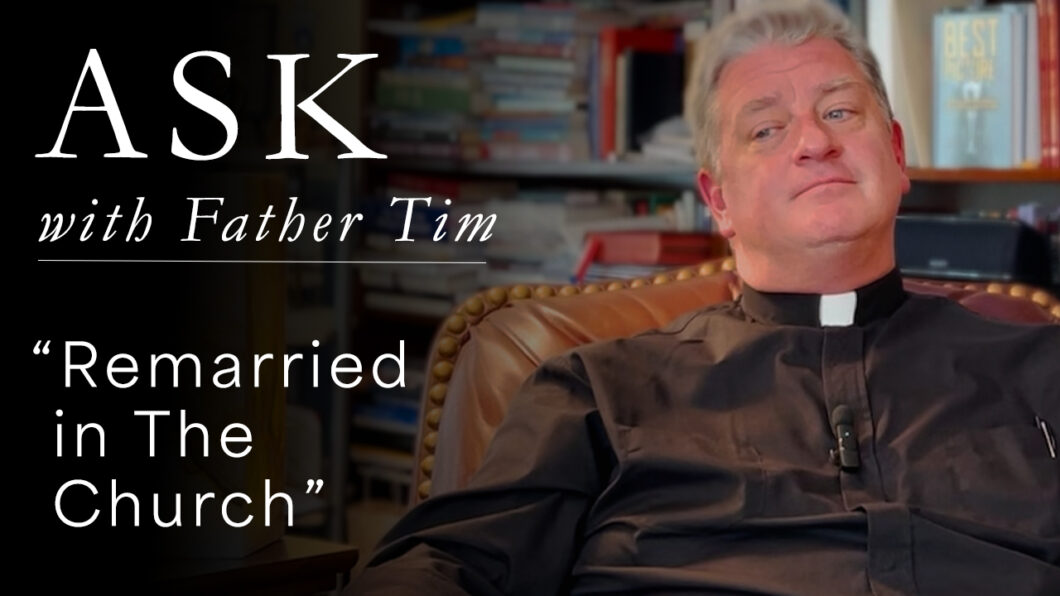ASK FATHER TIM - EP 8
Why Confess Through a Priest Instead of God Through Prayer?
Well, we're a kinder, gentler church now. I would encourage anyone that has been away from the Sacrament of Reconciliation to come and experience it anew.
In the story of the Prodigal Son from Luke chapter 15, one of my favorite verses is number 29, "And then the celebration began." That was when the father and the prodigal son were reconciled with each other. And that's why we call it the celebration of the Sacrament of Reconciliation. As we are restored and right relationship with God, with our fellow man, and any obstacle standing between us and heaven and happiness are taken away. But yes, people might ask why do we have to confess to a priest?
Well, this is one of those situations where we truly can find an answer in God's Word. And so we're right towards the end of the New Testament, where in the letter of James, the New Testament letter of James, where it talks about confession and the anointing of the sick.
In the same verses I'm going to pick it up in James chapter five, verse 13. It says this "if anyone among you is suffering hardship, he must pray. If a person is in good spirits, he should sing a hymn of praise. Is there anyone sick among you? He should ask for the presbyters of the church. They, in turn, are to pray over him, anointing them with oil in the name of the Lord. This prayer, uttered in faith, will reclaim the one who is ill, and the Lord will restore him to health. And if he has committed any sins, forgiveness will be his. Hence, declare your sins to one another and pray for one another, that you may find healing."
That's the answer in a nutshell. Presbyter that was referring to the priesthood that was instituted by Jesus Christ in the Upper Room on Mount Zion at the Last Supper. He said, "Do this in memory of me." Jesus is empowering those apostles and the priests who would follow them through the laying on of hands, not only to confess, to the Eucharist and turn bread and wine into the abiding presence of his body but soul and divinity, but also to continue to be the hands and heart of Jesus, reaching out in this world, darkened by sin and death, to show people who had wandered away back to the flock. To show people who felt close to death and despair a way to heaven and happiness.
To admit of our sins, and to find a means of having those sins taken away.
The Jews who preceded Jesus Christ would be envious of our ability to have this happen. They had the Day of Atonement. It was a time set aside each year in the Jewish calendar where they could admit of their sins, but no one could forgive them their sins, no matter how many burnt offerings they offered up and sacrificed to appease God's wrath in the temple, not one of their sins was forgiven, but when Jesus Christ, the Son of God came, who is the priest, the altar, the lamb, and the sacrifice, every sin of every center throughout time was forgiven and redeemed once and for all, when he chose to die on that cross, that we might be forgiven and become forgiveness.
In the early church centuries ago, there was the public order of penitence, where people had to enroll in the presence of the bishop to be part of the Order of Penitence, and it would require a public confession of their sins, and perhaps some onerous or burdensome penance that could take years to complete, or might use up all of their life savings. That didn't seem like the actions of a church acting on behalf of a merciful God.
And that is why, over time, we reclaim the truth of Scripture. And the church is always reforming, trying to get back to the zeal of the apostles and the church they built. When Jesus gave Peter the keys, and when the Bible says, "confess your sins to another". It had just said, seeking healing from the priest. We've connected those two together and what is called the auricular confession. Auricular - oral. It is heard, it is spoken, it is heard in the presence of another. It is not the priest who forgives sins.
It is Jesus who forgives sins through the church and its priesthood.
It is necessary for us to take responsibility for our actions. Let's say you are a married person, and if you prayed only to God to forgive you for things that you did against your spouse, God might feel merciful towards you, but your spouse may not realize that you have a changed heart sometimes for admitting these things to ourselves. We're not telling God anything he doesn't already know. He knows even things that we don't know about ourselves. And he loves us anyway. And he loves us always. And he loves us in all ways. Jesus already died that all these sins might be forgiven, and the priest can never breathe any word to anyone about something that he has learned about in confession.
You've heard the phrase confession is good for the soul. There are so many times in my 25 years of priesthood when I have encountered someone in the second reconciliation that is truly broken and they're carrying a very heavy cross, some grudge or resentment, some past sin or hurt that they can't let go of, and we offer them to leave it at the foot of the cross, the blood and water, the food from Jesus side, and an ocean of mercy might take it from them. We'd really be missing out if we didn't have that opportunity to be able to go to someone, to be able to go somewhere, to take some action, a step in the right direction, to correct the misstep. And that was our sinful past. If all we were doing was praying to God, we might venture to one extreme or another.
On the one hand, we might be too easy on ourselves, diminishing the gravity of the sin and not trying hard enough to show a firm purpose of amendment or make any restitution for what we've done. Of course, on the other hand, we might be too hard on ourselves, and there are those who suffer from scrupulosity that feel that everything they do isn't just a little bit wrong, but serious human and a grave offense to a wrathful God.
God wants us to know his mercy. That's why he sent his Son to give us life, to forgive us in the first place. And so in the sacrament reconciliation, then we have someone we can trust, someone who will help us to know once and for all. This sin can be taken from you. If we're willing to make that firm purpose of amendment, to do penance, to receive absolution, and to take a step in a new direction.
This sin can be taken from you.
If we were only praying to God, we may begin to wonder, did I say it the right way? Did I remember everything? Did I try hard enough? Yet when we're in the second reconciliation, when the priest says the words of absolution, when we have the sign of the cross made over us, and we go forth and do penance for our sins, our faith teaches us that sin or sins are removed so powerfully that our soul, as it was when it was newly baptized and claimed for Christ, for heaven, and for happiness.
Who wouldn't want that?
There are too many people in this world that are so upset, so hurting, so angry about a past we can't change, about a future we can't predict or control. But God in the present has given us all the Sacramento encounters, these opportunities to close the gap that has grown between he and I because of our sins, and to come together once more at the foot of the cross in hopes that all of us, for one, be to be one day together at the throne of the lamb.
It's a gift that God has given to us, and even priests have to go to confession. Bishops go to confession. The pope goes to confession. They say that Pope Francis went to confession once a week. They say that Saint John Paul the Second went to confession every day. Maybe that was because of the great burden he was carrying, trying to guide and govern the church through turbulent times.
But also, it might just be why he is a saint, because he realized that he was a sinner and God was a forgiver. I hope you and others will realize that it is only for our benefit, not God's, that we have the second reconciliation, and he has given it to us only because he desires heaven and happiness for us.
So he doesn't want anything to stand in the way, nor for us to entertain any doubt that there's more we could have or should have done. The should have, could have, would, is the if only of this world. They don't offer us very much but pockets of empty promises. But God has given us His son. His son has given us the church, and the church provides us these sacraments so the invisible God can once again reach down into his creation and heal wounds, mend fences, build bridges to bring us closer to him and to each other.
ALL ROADS CATHOLIC MEDIA
Share &
Evangelize
If you find this valuable, share it as a way of living out the Christian Mission to proclaim the Gospel to all of creation.

